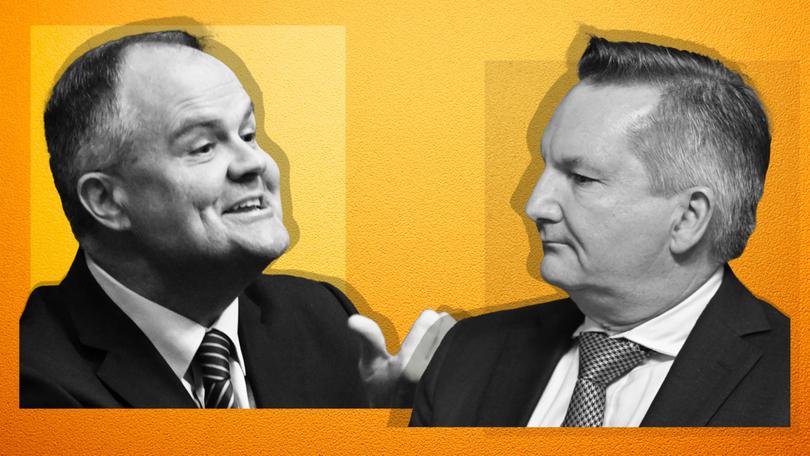Federal power play: Energy Minister Chris Bowen and Coalition counterpart Ted O’Brien trade shots
Both Labor and Coalition heavyweights have reignited the climate debate amid raging rhetoric on renewables and nuclear energy.

The two men vying to steer the country’s energy policy in the next parliamentary term say Australians have a crucial choice to make when the next election rolls around, about what path the country takes on the road to net zero by 2050.
With an election due in May and with mounting speculation Prime Minister Anthony Albanese may send the country to the polls early, both sides of politics are sharpening their tools, reigniting climate culture wars and taking aim at each other over how best to ensure Australian power bills don’t exponentially rise and the lights stay on.
Energy Minister Chris Bowen laid down the gauntlet at a National Press Club address on Wednesday, panning the Coalition’s nuclear plan and “all of the above” energy mix, which he warned would lead to investment in “reliable” renewables grinding to a halt in a critical decade.
Sign up to The Nightly's newsletters.
Get the first look at the digital newspaper, curated daily stories and breaking headlines delivered to your inbox.
By continuing you agree to our Terms and Privacy Policy.Meanwhile, his Coalition counterpart Ted O’Brien told the Clean Energy Summit that while renewables had an important role to play in a balanced energy mix, Labor’s plan to phase out coal and most gas by 2030 without a shored-up renewables industry capable of meeting demand would lead to soaring bills, blackouts, the collapse of industries and mass job losses.
Their competing speeches came after the Australian Energy Market Operator last month warned the pace of the renewables roll-out needed to double to 6GW a year if it was to meet decarbonisation goals and fill the gap left as ageing coal plants closed down.
Mr O’Brien called on the Government to stop misleading the public about the success of the renewables roll-out, amid a backdrop of approval and construction delays slowing the development and connection of large-scale solar and wind plants.
That has led to price increases, which has prompted the government to increasingly acknowledge the critical role gas will play in shoring up the energy grid to 2050 and beyond.
Mr Bowen reiterated on Wednesday that gas “will play an important role” in the future energy mix, likening it to “life insurance”.
“You don’t need it very often, but when you need it, you really need it. That’s the underpinning role of gas in the system,” he said.
He said the best way to ensure Australia’s energy future — including one in which bills remained affordable — was to secure investment to ensure solar, wind and hydrogen now, to meet the rising demands of electrification, and replace the ageing coal-fired power stations.
“Investment is vital now ... It’s critical we keep the pipeline of investment flowing,” he said.
We’re running out of energy, which is why you don’t close down one system without having another one ready to go.
He said Australians had a “choice” at the next election, and urged people to “stay the course” and not “risk” an unknown nuclear future.
The future of gas is also shaping up to be a major electoral issue, with Labor’s insistence that gas will continue to play a role in the energy grid likely to alienate some in the voter base who favour the Greens’ rhetoric against the resource.
A key divide emerged on Wednesday, with Mr Bowen saying it was not the Federal Government’s role to finance investment in gas, instead arguing that more gas needed to be “poured into the system”.
“We need gas. We absolutely need it. As a nation, we are setting renewables up to fail unless we have complementary technologies that can work with them,” Mr O’Brien said.
“And right now, gas is absolutely critical to play that role, which is why we have been unashamedly critical of the government saying, ‘Stop making market interventions, which is drying our capital, increasing sovereign risk’.”
Mr O’Brien also said the Albanese Government’s plan to phase out firmed capacity like coal and gas before the renewables rollout was fully scaled up had caused a “black hole”.
“We’re running out of energy, which is why you don’t close down one system without having another one ready to go,” he said.
He said more broadly, while renewables had a vital role to play in powering the grid, Australia could not rely solely on them.
“We are on our own, internationally thinking that we can have an electricity grid run predominantly by intermittent wind and solar ... I see no sense in putting all your eggs in one basket no matter what you’re doing.
“Whether it’s your diet, whether it’s your investment portfolio, certainly when it comes to electricity grid, we are on our own going down the pathway being set.”
He said the Coalition wanted to ensure Australia had a “balanced energy mix” that, as coal was phased out, would include nuclear energy.
In Canberra, Mr Bowen took aim at the Coalition’s nuclear plan, labelling it a “triumph of dogma over data”.
“The biggest problem of all is that Australia, in Australia, nuclear and renewables simply aren’t compatible with each other,” he said.
“While the opposition purports to support an all of the above energy mix, their ideological pursuit of nuclear reactors in two decades’ time will wreck the renewables rollout today.”
Opposition Leader Peter Dutton said Australia deserved a “mature discussion” about it, disagreeing with Mr Bowen that it was a choice between “renewables and nuclear”.
“Our policy has renewables, it has gas and it has the underpinning of a baseload power,” he said.
Asked what portion of the Coalition’s plan would be renewables, Mr Dutton said he would release those details in time.

